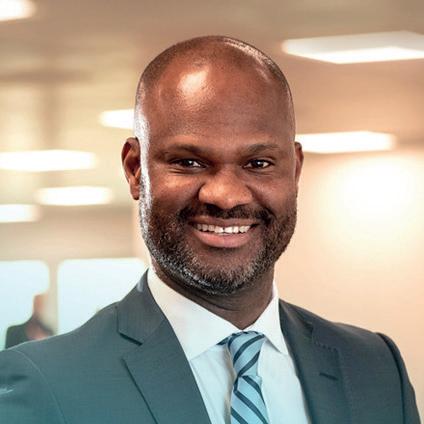Managing Your Money




Read more at www.businessandindustry.co.ukQ3 2022 | A promotional supplement distributed on behalf of Mediaplanet, which takes sole responsibility for its content
“If you’re struggling financially, you’re more likely to experience a mental health problem.” Vicki Nash, Associate Director of Policy, Campaigns and Public Affairs, Mind
Page 02
“Now is the time to pay some attention to your pension.”
Joe Dabrowski, Deputy Director of Policy, Pensions and Lifetime Savings Association (PLSA)
ONLINE
How finance providers can support customers in financial difficulty


The rising cost of living is evident all around us. It can be easy to find it overwhelming, and for anyone worried about their finances, it’s important to seek help early.
WRITTEN BY Eric Leenders
Director
Personal
How the cost of living crisis risks everyone’s mental health
The adage ‘money doesn’t buy you happiness’ is a strange one. Although money doesn’t guarantee you’ll feel good, for the millions of people across the country bearing the brunt of the cost of living crisis — waking up to a cold house or hungry children — this saying will ring hollow.
another. Our mental health services are on the brink of collapse.
Banks
and other finance providers are ready to support their customers. They offer a range of tools and resources on their website and in branches to help you manage your money — whether through ways to maximise your income, reduce your costs or support your mental health.
Financing options
Lenders can work with you if you are having trouble paying your mortgage, credit card or personal loan. They can offer you what is called ‘tailored support.’ This means it will be focused on your individual circumstances and based on what you can afford.
For credit cards and personal loans, this could include making reduced payments for a short period or setting up a longer-term repayment plan. For a mortgage, your lender might offer an option such as a part payment plan, extending the mortgage length or temporarily transferring to an interest-only mortgage.
To help you get the support you need, your bank or finance provider may ask questions about your income and outgoings so they can better understand your financial circumstances. They will then be able to explain the options available to you and what the tailored support being offered means, including how these would be reflected on your credit file.
Lender access
You can contact your lender in several different ways. These include via mobile and online banking services, on the telephone or in-branch. Their website will also provide helpful information, and you should also refer to any letters that you may have received.
If you have several debts across different lenders or you are having trouble paying your other bills, you may benefit from free and impartial debt advice. A debt adviser will help you work out which debts to pay first and help you deal with different lenders. They may also help you find out if you are entitled to any state benefits or tax credits, which can help increase your income.
During these difficult times, it’s important to know that there’s help at hand. If you’re facing financial difficulties, speaking to your bank or finance provider is a valuable first step.
MoneyHelper provides information on free and impartial debt advice. You can access this support online (which may be quicker), via the telephone or face to face.
The New Economics Foundation estimates that 5.2 million more people will be pushed into poverty as a result of the cost of living crisis. The strain households are under is now pushing many individuals’ mental health to breaking point.
Declining circumstances Mind’s Infoline has seen a 30% increase in the number of people getting in touch, telling us about their difficulties with money and debt. People are expressing anxiety and concern over bills, eviction and not being able to afford essentials.
Money troubles and poor mental health have a cyclical relationship.
If you’re struggling financially, you’re more likely to experience a mental health problem; and if you have a mental health problem, you’re more likely to struggle financially. The cost of living crisis means more people are struggling in both ways.
More people need support, and people already receiving support need more of it — but NHS mental health services can’t cope with demand.
Insufficient support
The most recent estimates suggest that 1.6 million people are on waiting lists for mental health support right now. A further 8 million people who’d benefit from support can’t access it at all.
These two emergencies — our underfunded, barely coping mental health system and the biggest cost of living crisis in decades — are threatening to run headfirst into one
Alongside full and proper funding for mental health services, the new Government needs to re-commit to implementing a 10-year, crossgovernment mental health plan. This ambitious vision must outline how different departments will collaborate to identify and tackle the many causes of poor mental health and the NHS backlog.
Financial wellness
We also need to see the UK Government properly supporting people with the lowest incomes through the welfare system. They are at the highest risk of financial destitution from rising costs and were already likely to be struggling with a mental health problem before the cost of living crisis. Making sure our benefits system gives people enough to live on is the bare minimum.
Money might not buy happiness, but a lack of it can certainly impact how we feel. If the UK Government doesn’t act now, it’ll not only be people’s finances at risk but their future health, happiness and wellbeing too.
02 MEDIAPLANET A PROMOTIONAL SUPPLEMENT DISTRIBUTED ON BEHALF OF MEDIAPLANET, WHICH TAKES SOLE RESPONSIBILITY FOR ITS CONTENTS READ MORE AT BUSINESSANDINDUSTRY.CO.UK
Lenders can work with you if you are having trouble paying your mortgage, credit card or personal loan.
Making sure our benefits system gives people
enough to live on is the bare minimum.
WRITTEN
BY Vicki Nash Associate Director of Policy, Campaigns and Public Affairs, Mind
Managing
of
Finance, UK Finance Project Manager: Matilda Dodwell matilda.dodwell@mediaplanet.com Business Development Manager: Josie Mason Managing Director: Alex Williams Head of Business Development: Ellie McGregor | Head of Print & Design: Thomas Kent Designer: Aimee Rayment Content Editor: Angelica Hackett O’Toole | Head of Digital: Harvey O’Donnell Paid Media Strategist: Jonni Asfaha Social & Web Editor: Henry Phillips Digital Assistant: Carolina Galbraith Duarte | All images supplied by Gettyimages, unless otherwise specified @BusinessandindustryUK Contact information: uk.info@mediaplanet.com or +44 (0) 203 642 0737@MediaplanetUK Please recycle
Good savings habits are about taking small steps, every day.
Return of the recession: how to create your own financial survival kit
The last recession in 2008 taught many people to set up monetary ‘survival kits’ to safeguard their pocketbooks should financial uncertainty return. Among the new generation of young professionals, many will likely be battling the effects of a recession for the first time.
Last
year, because of the pandemic and with limited opportunity to spend, some households managed to build a pot of savings.
WRITTEN BY Tafari Smith, Head of Savings, RCI Bank

Looking to the future beyond lockdowns, 49% of UK adults put away more cash intended for big milestones such as a house, car, holidays or planning for a family.
Savings lost Sadly, as we’re currently plunged into a cost of living crisis and with a recession looming, saving pots have been repurposed for survival.
According to RCI Bank’s research: 15% of UK adults have had to use their milestone savings to combat rising inflation, and a further 24% predict they will dip into them in the near future.

Everyone able should consider creating their own savings survival kits in preparation for the impending recession and beyond. Think of this as a contingency plan which could help you tackle inflation, debt, sudden unemployment and much more.
What does this survival kit include?
• A savvy budget: It is crucial to create a detailed budget — ideally for the week or the pay period — to see your outgoings and track all of your spending.
• Hacks to save early and automatically: Good savings habits
are about taking small steps, every day. Set up a small standing order to move money into your savings account once you get paid. At month-end, transfer disposable income from your current account to a savings pot to resist the temptation to spend.
• Easy access savings: Expect emergencies. It’s useful to have money set aside that you can immediately access in the short term. The RCI Bank Freedom account allows unlimited payments and withdrawals, so you can flexibly transfer cash whenever needed.
• Fixed term savings: Invest in your long-term future with notice and fixed term savings. The RCI Bank notice and fixed-term range offers competitive rates, and you can use a ‘laddering strategy’ to improve your yield.
• Employee perks: Check with your HR department to find out if your employer offers any perks that could help lower some of your everyday expenses, including discounted retail vouchers, access to cashback websites or low/no interest loans.
• Asset portfolio: Catalogue any assets you could convert to cash in times of need, including shares or stocks, antiques, jewellery, artwork, cars or property.
• Emergency help: Visit gov.uk and your local council website to find out which programmes, charities or companies can help you lower your childcare, transport or utility costs and improve your financial wellbeing.
• When choosing where to put your savings, it is important to ensure the interest rate is guaranteed. Some providers may offer a tempting — but temporary — bonus rate that falls away after a period. Be cautious of limited-access accounts that could penalise you for multiple withdrawals.
Backup plan
Our research shows that in the last year, almost one in seven (13%) savers have knowingly lost out on the interest rate they opened their account with, as they urgently needed access to their savings.
As both inflation and interest rates climb, it’s important to have a contingency plan, preferably with a growing monetary cushion for whatever life throws at you. Do research thoroughly, and pick a product that won’t punish you when life inevitably happens — especially during a time when you may already be struggling financially.
A PROMOTIONAL SUPPLEMENT DISTRIBUTED ON BEHALF OF MEDIAPLANET, WHICH TAKES SOLE RESPONSIBILITY FOR ITS CONTENTS READ MORE AT BUSINESSANDINDUSTRY.CO.UK 03MEDIAPLANET
Read more at rcibank.co.uk
Paid for by RCI Bank
Open banking tools help with money management in current cost of living crisis
With many of the UK’s households facing the challenge of rapidly rising costs, understanding how to make your money work harder is key.
Incontrast to the impact of pandemic lockdowns, which saw marked increases in personal savings, we now face a significant inflationary pressure.
Financial data could help unlock better deals Typically, your financial data sits in your bank account. Open banking technology lets you safely and securely share the data with regulated financial firms.
Analysing that information — earnings, expenditure, regular bill payments, etc. — enables these firms to identify opportunities where you could manage your money better or access better deals. There is no catch — consumers and small businesses choose who they want to share their data with and when to stop sharing it.

Account dashboards provide a complete view
Having a clear, categorised view of spending over time not only enables a better understanding of your finances but also lets you know whether you are utilising all the benefits available. It allows you to act on upcoming overdraft charges, overspending or wasteful expenditure (such as unused gym memberships or duplicate subscriptions).
Open banking technology lets you safely and securely share the data with regulated financial firms.
Apps can help you save frequently This could be in the form of savings ‘roundups,’ which monitor your regular spending (such as a coffee or supermarket shop), round it up to the nearest pound and then move it to a savings account.
Instead of having financial information scattered across different accounts and providers, account dashboards let you see all of your accounts — bank accounts, credit cards and savings — in one place.
Saving apps calculate what you can afford to save each week or month (you have complete control over the amount and frequency). They can easily move the money from a current account to a savings account to accrue more favourable interest rates. Similarly, if your circumstances change, you can just as easily lower or cease the savings amount altogether.
Open banking can help you make better financial decisions
Consolidate all your accounts securely in one place through the power of open banking, helping you monitor your finances.
“
It always pays to have a clear overview of your finances and spending behaviour,” says Iain Russell, Head of Consumer Proposition at data and payments company, Moneyhub.


Easy money management
BY Tony Greenway
“You can better manage what’s coming in and going out.” The kicker, though, is that 39% of adults don’t feel confident about managing their money, according to statistics from the Financial Capability Survey.
Plus, while financial technology has made life simpler in many ways, it’s also made it horribly easy to lose track. “We’re constantly tapping our bank cards or phones onto contactless readers, which is quite passive,” says Russell.
All financial data in one place
That’s where open finance technology helps, because it allows you to connect and view all your accounts
while financial technology has made life simpler in many ways, it’s also made it horribly easy to lose track.
in one place, so you can understand the bigger financial picture.
For example, Moneyhub — a certified software developer of open banking, open finance and open data applications — enables you to securely connect to bank accounts, investment platforms, pensions and property valuation services. When users add their own accounts to the app, they have access to all their financial data on one platform.

04 MEDIAPLANET A PROMOTIONAL SUPPLEMENT DISTRIBUTED ON BEHALF OF MEDIAPLANET, WHICH TAKES SOLE RESPONSIBILITY FOR ITS CONTENTS READ MORE AT BUSINESSANDINDUSTRY.CO.UK Read more at moneyhub.com /app Paid for by Moneyhub
INTERVIEW WITH Iain Russell Head of Consumer Proposition, Moneyhub
WRITTEN
WRITTEN BY Charlotte Crosswell Chair and Trustee of the Open Banking Implementation Entity
BY Tony Greenway
How open banking offers real-time benefits for consumers and lenders
Open banking can benefit consumers and financial services companies because sharing of customer data in real-time allows lenders to make better credit decisions.
Alex
Marsh believes the UK could be on the cusp of a banking revolution. The big high street banks have had it too easy for too long, he says, because their customers have traditionally found it too troublesome to move to other financial services providers. But open banking — and, ultimately, open finance — is going to change all that by freeing up the system, making it more transparent and giving customers more flexibility and choice.
A more holistic view of finances
Marsh, Head of UK at Klarna, a Swedish fintech which provides online buy now, pay later (BNPL) services, points out that nearly 4 million people in the UK are currently using open banking — and in two ways.
Firstly, by making open banking payments at online checkouts that send funds directly to merchants or service providers at the click of a button. Secondly, by utilising a single app for a holistic view of their bank accounts.
Yet, Marsh thinks there’s another important way for open banking to benefit consumers and financial services companies — and, as a bonus, encourage more people to use it. “One of the areas we are active in — and where we see a very strong future for open banking — is credit underwriting,” he explains. “This works when consumers consent to share their bank account information instantly and securely with other financial services companies.”
Instant visibility of up-to-date customer data Marsh notes that this type of instant data sharing is good for customers who have limited (or no) credit histories but still need to demonstrate their financial health before lenders will grant them access to their services.
“Take those usually younger people who don’t have a mortgage or credit cards, haven’t built up credit scores and therefore struggle to get access to lower-cost forms of credit,” he says. “They may have good incomes and be responsible spenders; but without a credit file, they can be unfairly penalised by lenders and pushed into taking out high APR loans and credit cards.”
However, with open banking, lenders have immediate visibility of their finances and can make quicker decisions about their credit applications.
This type of instant data sharing is also a boon for companies like Klarna, who have a social duty to lend responsibly. “There’s no financial incentive for us to offer our products to customers who we don’t believe will be able to repay us on time and in full,” says Marsh.
How ‘open banking’ will broaden into ‘open finance’ Lenders usually do this by obtaining information about potential borrowers from credit reference agencies (CRAs); although CRA data can be as much as four to six weeks old. On the other hand, open banking offers immediate visibility of an applicant’s financial data in real time. “Analysing up-todate financial information allows us to comprehensively assess a person’s suitability for our interest-free services, which ultimately saves them money,” says Marsh. “That’s why I think open banking can be amazing.”
They may have good incomes and be responsible spenders; but without a credit file, they can be unfairly penalised by lenders and pushed into taking out high APR loans and credit cards.
Still, he stresses that uptake of open banking (which is mandated by both UK and EU regulators) will only increase when consumers become confident that information is shared securely. “I believe the adoption of open banking will grow when customers realise the standards and protocols are in place to protect them — and they see the benefits it offers.” Ultimately, Marsh expects open banking to develop into a wider open finance model if the likes of mortgage providers and pension providers get on board. “Open finance offers much broader consumer benefits,” he says. “That’s because customers will be able to view their entire financial situation — bank accounts, credit, insurance, mortgages, pensions, etc. — in one place and move freely between the best value financial products and providers.”

A PROMOTIONAL SUPPLEMENT DISTRIBUTED ON BEHALF OF MEDIAPLANET, WHICH TAKES SOLE RESPONSIBILITY FOR ITS CONTENTS READ MORE AT BUSINESSANDINDUSTRY.CO.UK 05MEDIAPLANET
INTERVIEW WITH Alex Marsh Head of UK, Klarna Read more at klarna.com/uk/
Paid for by Klarna WRITTEN
WRITTEN BY Guy Rigden CEO, MyBnk

How financial education lays the framework for financial freedom
Rising energy bills and fuel prices, stagnant wages, increased inflation and a looming recession make for headlines filled with negative terminology that young people may not understand.
Without
knowledge of the concepts, products or economic state they are about to enter, how can the young people of today thrive as adults tomorrow?
Linking money and wellbeing
Money and debt have long been taboo subjects that have challenged previous generations, leading to detrimental and, at times, devastating effects on welfare.
For example, people in debt are three times more likely to consider suicide as those without a debt problem. Research from The Children’s Society also found that household problem debt is associated with lower wellbeing in children — a worrying statistic given that 3.9 million UK children live under these circumstances.
Our money choices affect and link with many other aspects of our lives, including our relationships with others, selfconfidence and career prospects. Improving the financial capability of young people can help prevent serious future problems, such as poor mental health, unemployment and homelessness.
Breaking the cycle
MyBnk is a charity that delivers expert-led financial education programmes to 5–25 year olds in UK schools and youth organisations — directly, virtually and online.
Together with young people, we have created innovative,
How to approach money management for better financial wellbeing
Support is available to help ease the cost of living crisis, including from employers and wider resources. A financial wellbeing expert highlights some of the initiatives available.

 WRITTEN BY Tony Greenway
WRITTEN BY Tony Greenway
JenNorris, financial wellbeing expert at pensions advisory firm, Isio, admits that she has never known a time like it. The cost of living crisis is soaring, inflation is high and energy bills are skyrocketing. “We’ve been through recessions before, but this is a worrying period,” she says. “On the positive side, people are starting to talk openly about money — which has been taboo in the past — and sharing tips with each other. That’s really useful.”
Security in everyday life
The words ‘financial wellbeing,’ will be in many conversations because if you don’t have it, you’re going to want
high-impact and high-energy workshops that bring money to life. We also leverage our impact and expertise to drive systemic change.
With the current cost of living crisis set to exponentially impact young people for years to come, it is time to act and invest in their future happiness. Higher incomes, consumer protection and better products are all useful for improving financial wellbeing. But it is essential young people are educated and equipped to make the right money choices for themselves. There are many sources of money guidance but many are irrelevant, ill-informed, of unproven impact or linked to selling. Through the delivery of impactful and evaluated financial education, organisations like MyBnk can help to break these cycles for young people as they transition to independence.
Achieving financial freedom
For MyBnk, financial freedom is knowing what to ask and who to trust to build the capability and confidence to make the right money choices for our wellbeing.
Our Financial Freedom campaign is unapologetically tackling the taboo around money and helping build financial confidence. Focusing on young people who are in most need, we will deliver practical financial education to over 250,000 children in their schools and homes.
Financial tips that make a difference
Many employers have support initiatives in place, so Norris advises employees to ask what is available.
“They may have discount platforms that offer staff savings off the weekly food shop and contribute towards fitness and health activities. Or they may run an EAP — an employee assistance programme — to help with debt, mental health and more.”
Outside the workplace, people should investigate state support, including help with energy bills and any benefits they’re eligible for.
to get it. “I see it as having the tools, capability and confidence to make the most of your money and help you feel more in control,” says Norris, who works with organisations that want to find ways to support their employees with the cost of living. “In the past, some organisations have thought of financial wellbeing as a ‘nice to have’ service for their employees. Now, it’s top of their agendas.”
That stands to reason because happy employees are more efficient and productive. “If employees are under financial stress, it can affect their mental wellbeing,” agrees Norris. “And if they can’t afford to eat properly or go to the gym, it can affect their physical wellbeing.”
The words ‘financial wellbeing,’ will be in many conversations because if you don’t have it, you’re going to want to get it.
Trends in your bank account
But if Norris has one big money management tip for future-proofing finances, it’s this: study where your cash is going.
“Tracking your spending is a good budgeting exercise because it helps you identify areas where you don’t even know you are spending money,” she says. “It also shows you where you spend the most. It’s not about staying in, spending nothing and doing nothing. That’s like a fad diet: it’s really hard and won’t work in the long run. Instead, it’s about making little changes for a better financial balance.”
06 MEDIAPLANET A PROMOTIONAL SUPPLEMENT DISTRIBUTED ON BEHALF OF MEDIAPLANET, WHICH TAKES SOLE RESPONSIBILITY FOR ITS CONTENTS READ MORE AT BUSINESSANDINDUSTRY.CO.UK
Scan the QR code to find out more
Paid for by Isio
INTERVIEW WITH Jen Norris
Financial Wellbeing Expert, Isio
Four ways to help students manage their finances
For many, living independently and managing finances can be an overwhelming task. Money management is becoming a real focus for students due to the cost of living crisis.
Within the fast-evolving economic climate, it is increasingly important for university students to gain a better understanding of their own finances and habits. But where do they go for advice?
WRITTEN BY Alex Gallagher Chief Strategy Officer, UNIDAYS

Research showed that the majority (69%) of Gen Z depend on their parents for financial advice. However, it’s clear that there are gaps in parents’ knowledge. Insightful research from UNiDAYS revealed that nearly one in five parents are not confident in explaining how to manage their finances to their Gen Z children.
Mastering the art of budgeting
Learning how to budget can take a while to get to grips with. Taking the time to learn and absorb new information is key to helping students manage money better.
Learning to budget will help with keeping on top of expenditures and provide a clearer picture of savings. Starting with a simple budgeting system can make all the difference — logging spending on either a weekly or monthly basis.
As an example, UNiDAYS has recently partnered with the banking service app, Revolut, to help members save, monitor and maintain their finances. If that wasn’t enough, it can also be personalised to individual needs.
Always ask for a discount
Students will continue to spend in 2022 and beyond. Recent research revealed that freshers will spend 18% more than returning students.
We know that students have a keen eye for a bargain and with a multitude of deals available to them, they rarely must pay full price.
There are apps and templates designed to help groups keep tabs on spending and lending.
There are apps and templates designed to help groups keep tabs on spending and lending. These will help student budgeting by splitting everything fairly between housemates, removing the need for those awkward discussions about money or chasing housemates for their share of the bills.
Open a student bank account
From improving budgeting skills to long-term saving goals, opening a student bank account is a savvy decision to make. It will likely help students use their money more responsibly.

Student bank accounts allow money to be paid in and out, alongside benefits such as interest-free overdrafts and other extra, useful perks such as free railcards.
Although it can be hard to remember all the different companies offering student discounts, whether it’s 5% off or 40% — every little does help. As the global marketplace for students and graduates, UNiDAYS offers a wide selection of exclusive discounts across the world’s biggest brands — from Apple and Samsung to SHEIN and Bershka, as well as exclusive offers across study and wellbeing resources designed to help students get better grades and manage the challenges of college and university life.

Make your money stretch further
Now more than ever is the time for Gen Z to make their money and go the extra mile.
By taking the right approach to budget planning, using deals and offers and choosing a bank account that best suits their needs, students will be able to level up their game when it comes to money management.
A PROMOTIONAL SUPPLEMENT DISTRIBUTED ON BEHALF OF MEDIAPLANET, WHICH TAKES SOLE RESPONSIBILITY FOR ITS CONTENTS READ MORE AT BUSINESSANDINDUSTRY.CO.UK 07MEDIAPLANET
Paid for by UNIDAYS Find out more at myunidays.com
Difficult times ahead as inflation grips and consumers are unprepared
“It also seems that consumers are not acknowledging the financial squeeze until their actual cash costs go up. While prices for food and fuel have already risen, many consumers will only now be starting to experience the impact on their energy bills — the single, largest driver of cost increase — as their boiler gets switched back on for the autumn.”
Changing landscape
The situation, however, is set to change as higher bills come through, mortgage payments increase and the job market slows.
It’s anticipated that households will have to cut consumption by 3%–4% by October relative to March 2021.
Miles says: “They will respond by cutting both discretionary and essential spending — eating out, recreation, leisure, then energy and water usage. Looking ahead, I think the experience of prices going up ahead of wages will persist; and while cost rises work through, it will continue to be painful.”
Things, however, are set to change as higher bills come through, mortgage payments increase and the job market slows.
Soaring inflation has led businesses to experience ongoing increases in costs, whereas consumers have not yet changed their spending habits or felt the impact of the energy prices this season.
Survey
findings reveal that while consumer confidence is at an all-time low, people are surprisingly optimistic about their ability to maintain their standard of living.
However, for businesses, the temperature has dropped significantly, as they have already had to deal with a build-up of difficulties linked to post-Covid-19, the war in Ukraine and supply shortages of certain goods.
This has sparked unprecedented levels of inflation — on average, beyond 15% over two years — but wide variations have been seen in some sectors. The knock-on effect has prompted price rises and heightened anxiety within the business community.
The false dawn
To provide clients with a holistic view of the supply and demand positions

of the current inflation issues and support them with robust evidence, L.E.K. Consulting, a global strategy consultancy, has just released the results of its research.

The firm interviewed about 3,000 consumers in the UK and France and 1,000 mid-cap companies across four countries in Europe to determine what inflation means for business costs, how price increases are being passed on to consumers and how consumers are managing their spending as a response.
Dominic Miles, Partner, Consumer Global Co-Head, says that there are several possible reasons why consumers felt that their standard of living would be maintained and that they would not need to make major changes to their patterns of consumption.

“Following the pandemic, there is a general sense of having now returned to a much more normal standard of living as people have been able to go out in the evening and holiday abroad again. Having these freedoms are ‘better’ even with higher inflation.
Industry response Jean-Philippe Grosmaitre, Partner and member of the Global Organization and Performance Practice, explains that businesses generally do not expect much reduction in demand volumes, but will experience rising revenues and a weakening in profit margins.

“Companies, on average, expect to lose 25% of EBITDA (earnings before interest, taxes, depreciation and amortisation) as a consequence of inflation and limited capacity to pass it through in prices,” he says.
Coping mechanisms
Many firms are taking short-term measures to cope, like promoting more profitable products or cutting their marketing budget and other expenses. It has not yet gone to the point of having to re-engineer products or revisit the make-or-buy strategy, although that will happen eventually.
Grosmaitre points out that onethird of those surveyed had managed inflation by increasing prices, while 20% were really in trouble and already seeing a 50% reduction in EBITDA.
08 MEDIAPLANET A PROMOTIONAL SUPPLEMENT DISTRIBUTED ON BEHALF OF MEDIAPLANET, WHICH TAKES SOLE RESPONSIBILITY FOR ITS CONTENTS READ MORE AT BUSINESSANDINDUSTRY.CO.UK
Scan the QR code to find out more Paid for by L.E.K. Consulting INTERVIEW WITH Dominic Miles Partner, L.E.K. Consulting INTERVIEW WITH Jean-Philippe Grosmaitre Partner, L.E.K. Consulting WRITTEN BY Sheree Hanna
















 WRITTEN BY Tony Greenway
WRITTEN BY Tony Greenway






